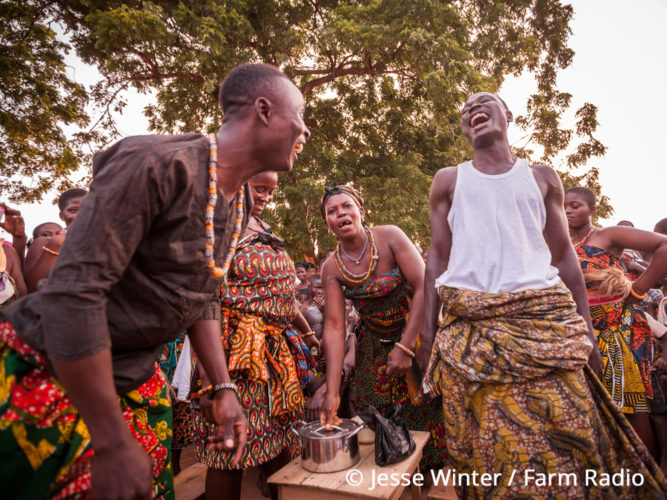Radio dramas been inspiring imitation and awakening awareness among households in the western zone of Burkina Faso, where they are broadcast on some local radio stations in the administrative regions of Hauts Bassins and Boucle du Mouhoun.
With the influence of technology, entertainment has become a privileged consumer good. Radio dramas have joined the trend, giving audiences the opportunity to break the routine and free themselves from stress.
By its very particular decor, radio dramas fit an imaginary universe into the daily reality of listeners becoming an excellent channel for educating, conveying, and perpetuating cultural values, thus facilitating relational, intellectual, civic, and social development.
This particular communication strategy was adopted and implemented by Farm Radio International as part of its Scaling Her Voice project (‘Voix de Femmes à grande échelle’), designed to solve two major development issues in four West African countries (Senegal, Mali, Ghana and Burkina Faso).
The first issue is related to food insecurity in small farming communities, especially among women, girls and young people. The second concerns the empowerment of women as leaders and managers to enable them to contribute to food security by facilitating their access and the control of relevant and affordable services related to knowledge, information and communication, as well as in the areas of gender inequality and the promotion of the rights of women and girls in rural communities.
Its purpose can be summed up in the establishment of inclusive farming systems that improve food security, nutrition and income for family farmers and their families.
Two drama series designed and performed in local languages in the form of short, captivating episodes, tackle rich and diversified topics that highlight various facets of gender-based violence, women’s economic dependence and forced marriages, with scenes that are modeled on local realities.
Both entertaining and educational, these two series of 12 episodes, varying from 7 to 10 minutes, expose common challenges within the community such as secured access to land, and open inclusive discussions to overcome these challenges.
For example, a scene involving the president of the village development committee of Kabadéni, exposes the marginalization of women in the management of yields despite their strong involvement in agricultural production. An open discussion with the men and women in the village square is an opportunity for the leader to share knowledge on the need to involve women, to empower them and to value them in order to strengthen family cohesion.
Feedback from listeners highlights the role of radio dramas in the formation and positive transformation of communities as testified below:
Mrs. Catherine Ouedraogo, a farmer from Koho Gnabiro village, declares that these radio dramas carry the voices of women to men by expressing what women are often afraid to say. “We experience a lot of violence in our homes and through these broadcasts our husbands hear and understand that they are really harming us. Many thanks to the initiators of these shows,” she says.
Oumou Sangaré from Yèrèssoro village, 29, married and mother of two, explains that before, her husband never consulted her on the planning of agricultural activities and she was not involved in decision-making either, “But today, thanks to the programs we listen to together, these practices have changed and this has helped us a lot to succeed in our agricultural activities”, she concludes.
These radio series have also become popular appointments within the target communities, as Pierre Tankuy from the Tiomboni village indicates: “On Fridays we look up hastily to the time, 8 p.m., to see what Mahadou (the main character in the series) will do again to Batogma (his wife) and his children. ‘ANW KA SENE YIRIWALI SIRA’ is our favorite show. We have fun and learn at the same time without getting bored. The show ends without us realizing it“.
This technique has therefore become an excellent way to transform men and women, empowering them as real assets for the development of their communities.


Comments are closed, but trackbacks and pingbacks are open.